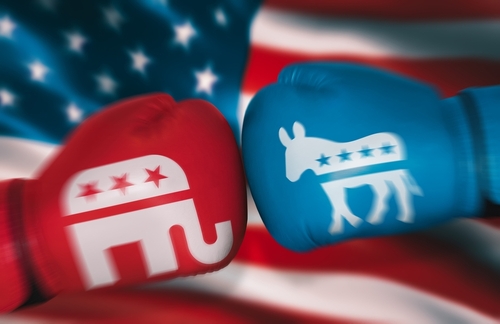
In a display of raw emotion rarely seen within the hallowed halls of Congress, Republican Senator and former mixed martial arts fighter Markwayne Mullin engaged in a heated confrontation with Teamster boss Sean O’Brien during a recent Congressional hearing. The incident, which nearly escalated into a physical altercation, has sparked a nationwide conversation about civility and decorum in political discourse.
The tension-filled exchange occurred during a Committee on Education, Labor, and Pensions hearing, where Mullin confronted O’Brien over a series of provocative tweets dating back to June. O’Brien had previously challenged Mullin to a fight on social media, branding him a “clown” and a “fraud.” In response, Mullin seized the opportunity to address the challenge face-to-face, suggesting they could settle their differences as “two consenting adults.”
Oklahoma Senator Markwayne Mullin challenged a witness to a physical fight in the middle of a committee hearing.#Oklahoma #MarkwayneMullin #SENPOL pic.twitter.com/8cJ9yuAsjq
— Shashank Singh (@RccShashank) November 15, 2023
As the situation intensified, Mullin invited O’Brien to stand up and engage with him then and there. The teamster boss appeared willing to accept the invitation, leading to a moment where Mullin adjusted his wedding ring and seemed poised for a physical confrontation. It was at this point that Senator Bernie Sanders intervened, demanding that Mullin resume his seat and reminding him of his role as a United States senator.
This is not the first instance of animosity between the two men. In a previous Senate Health, Education, and Labor Committee hearing, O’Brien accused Mullin of being a “greedy CEO,” to which the senator retorted sharply. These repeated clashes have underscored the personal nature of their feud, which has now spilled over into the public eye.
Markwayne Mullin on Fox Business: "Some people say, is this behavior unbecoming to a senator? I don't know. But I will tell you this for sure: That's not we behave in Oklahoma, and I'm an Oklahoman first … I was ready to shut his mouth up." pic.twitter.com/EW1kTflE4v
— Aaron Rupar (@atrupar) November 14, 2023
Senator Mullin, who is serving his first term as a senator from Oklahoma after being elected in 2022, has a history as a House member since 2013. His background as an MMA fighter seems to have informed his confrontational approach to politics, a trait that has both supporters and critics.
The near-brawl in Congress came on the heels of another incident involving former House Speaker Kevin McCarthy, who was accused of elbowing a colleague. These episodes have raised concerns about the increasing polarization and breakdown of traditional protocols within the legislative branch.
Critics of the altercation have expressed dismay at the erosion of civility in political engagement, arguing that such behavior diminishes the stature of Congress in the eyes of the American public. They contend that elected officials should hold themselves to a higher standard of conduct, setting an example for constructive debate and resolution of differences.
Supporters of Mullin, however, view his actions as a demonstration of authenticity and a refusal to be intimidated or disrespected. They argue that his willingness to confront detractors head-on resonates with constituents who are tired of what they perceive as political posturing and evasion.
The incident has ignited a broader discussion about the nature of leadership and representation in American politics. While some advocate for a return to more genteel forms of discourse, others champion a more direct and unfiltered approach as a means of cutting through the noise and achieving results.
As the dust settles on this latest Congressional skirmish, it remains to be seen whether this event will serve as a catalyst for change or simply be remembered as another symptom of a deeply divided political landscape. What is clear is that the appetite for change among the electorate is palpable, and politicians on both sides of the aisle would do well to heed the call for a renewed focus on policy and progress over personal vendettas.











